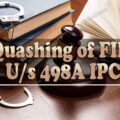The Karnataka High Court affirmed that an FSL report from a private laboratory cannot be disregarded without proper evaluation and requires substantial justification for rejection. This statement was made in response to multiple criminal petitions filed by the accused, who sought to overturn an order taking cognizance of offenses under Sections 403, 420, 467, 468, 474, and 120-B of the IPC and to dismiss the criminal proceedings against them.
A Single Bench of Justice M.G. Uma elucidated, “Even if the accused takes a stand regarding authenticity of the FSL report issued by the private laboratory, they are free to take the same before the Trial Court for any justifiable cause. But it cannot be held that the report submitted by any private laboratory is to be binned without considering the same. There must be strong reasons either to reject or to disbelieve such FSL report.”
In this case, FIRs were lodged based on complaints from a husband and wife, alleging that the accused conspired to forge their signatures, fabricated share-related documents, and used these falsified documents to commit fraud and misappropriation. The complainants claimed that in 2015, they received a registered post from Accused No. 1, indicating that 90% of their company’s share capital had been transferred to the accused.
Upon discovering that the signatures on the documents were forged, the informants suspected that the accused had stolen and misused their share certificates to create fake documents. As a result, they requested the police to register a case and initiate legal action against the accused.
The High Court in the above regard, noted, “It is the specific contention of the learned High Court Government Pleader that the disputed documents were referred for scientific examination and the report of the expert was obtained by the Investigating Officer before filing the chargesheet. A copy of the FSL report is produced for perusal of the Court.”
The informants found that the signatures on the documents had been forged. They reported that their share certificates were missing and suspected that the accused had stolen and misused them to produce counterfeit documents by forging their signatures. As a result, they asked the police to file a case and take legal action against the accused.
The High Court in the above regard, noted, “It is the specific contention of the learned High Court Government Pleader that the disputed documents were referred for scientific examination and the report of the expert was obtained by the Investigating Officer before filing the chargesheet. A copy of the FSL report is produced for perusal of the Court.”
The Court observed that the prosecution’s argument is that, prima facie, the disputed documents lack the informants’ signatures and that the signatures present were instead made by the accused. It further stated that, given the strength of this prima facie evidence, there is no justification for the accused to request the quashing of the criminal proceedings.
“It was noticed that there was a procedural lapse on the part of the learned Magistrate, while taking cognizance of the offence. It is observed that the police appears to be partisan in supporting the accused and the investigation was not conducted dispassionately. Under such circumstances, the Court observed that there is serious error in referring the disputed documents for verification to private laboratory instead of sending it to forensic laboratory run by the Government”, it further remarked.
“We are all aware of the number of Forensic Laboratory set up by the Government and its conditions in the State in particular, and in the Country in general”, it added.
The Court determined that the petitioners’ claim to dismiss the FSL report from the private laboratory was unfounded. As a result, the High Court dismissed the criminal petitions.





